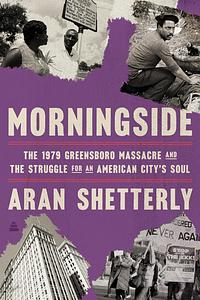Take a photo of a barcode or cover
Longtime residents or history buffs will enjoy this book. I came to Greensboro in 1986. I now have a greater understanding of the 11/3/79 events that killed 5 people.
(Audio) this was a fantastic read that I think was incredibly thorough, thought provoking, and well told. It did tend to drag in some places or be a bit too detailed, but i overall think I learned a lot from it and took a lot away from it.
Morningside by Aran Shetterly may not be lengthy, but it is packed with insight and depth, which could feel overwhelming to some readers. I’m not surprised to see reviewers from North Carolina mentioning that they had no prior knowledge of the events detailed here—this only underscores the very issues Shetterly explores. His focus on the indifference from the perpetrators and the Greensboro community, alongside the ongoing legacy of injustice through misinformation and stripped history, reveals how deeply these wounds are embedded. The fact that the families of the five victims are still fighting for acknowledgment only highlights the persistence of these injustices.
The audiobook added another layer to this experience, allowing Shetterly's passion for the topic to come through. His commitment to shining a light on the complexities of this tragedy and its far-reaching impact is evident in every word. This book urges readers to confront history, accept responsibility, and grow from it as a path forward—a profound message on how Greensboro could embrace its past to become a better place.
Shetty’s storytelling style is both meticulous and engaging. He goes beyond recounting the events of that tragic day, delving into the conditions that led to it and the lasting repercussions. Through his thorough research and nuanced perspective, he delivers a powerful and necessary examination of racial and political injustice that still resonates today. One of the aspects I found most compelling was the exploration of the Communist Workers Party (CWP), whose resilience and impact remain poignant reminders of the fight for justice.
This is a deeply educational and impactful read, one that Shetterly has crafted to hold readers’ attention and challenge them to reflect on history and its echoes in today’s world.
The audiobook added another layer to this experience, allowing Shetterly's passion for the topic to come through. His commitment to shining a light on the complexities of this tragedy and its far-reaching impact is evident in every word. This book urges readers to confront history, accept responsibility, and grow from it as a path forward—a profound message on how Greensboro could embrace its past to become a better place.
Shetty’s storytelling style is both meticulous and engaging. He goes beyond recounting the events of that tragic day, delving into the conditions that led to it and the lasting repercussions. Through his thorough research and nuanced perspective, he delivers a powerful and necessary examination of racial and political injustice that still resonates today. One of the aspects I found most compelling was the exploration of the Communist Workers Party (CWP), whose resilience and impact remain poignant reminders of the fight for justice.
This is a deeply educational and impactful read, one that Shetterly has crafted to hold readers’ attention and challenge them to reflect on history and its echoes in today’s world.
challenging
informative
reflective
slow-paced
Thank you to Netgalley and Amistad for providing me with a digital ARC of this book.
Morningside: The 1979 Greensboro Massacre and the Struggle for an American City’s Soul is a deeply salient account of the Greensboro Massacre, where a protest led by a local chapter of the Communist Workers’ Party (CWP) against the Klan culminated in an armed ambush by the KKK and Neonazis and ended with the deaths of five people on November 3, 1979.
As a Greensboro native who rarely ever heard of the 1979 Massacre growing up, I found this book to be devastatingly eye-opening and extremely detailed in its account of the event. Shetterly paints a colorful picture of a critical and overlooked point of American history through the lens of the Greensboro Massacre, when tensions between ideologies were on the verge of boiling over—post-McCarthy communist organizing, the blossoming white power militia movement in the wake of the Vietnam War, and the storied fight of multiracial coalitions in the South to create a better future in America. He also delves into the deep, conflicted history of the city of Greensboro, a city precariously balancing on a knife’s edge.
The violence committed on November 3, 1979 is unfortunately all too familiar to us now in an era where gun violence has become a startlingly regular occurrence. It has been almost a decade since a white supremacist killed nine people at the Emanuel African Methodist Episcopal Church in Charleston, South Carolina. It has been seven years since the 2017 Unite the Right Rally in Charlottesville, Virginia, where a neo-Nazi drove his car into a crowd of counter protestors and killed Heather Heyer. Within the last several years, we have seen an increasingly violent response from police and right-wing agitators towards peaceful protests all across the United States. This is a story about America’s past and present—and a plea for our future.
While the individuals whose lives were abruptly cut short that morning never received justice, their deaths did not snuff out their work. Their families, friends and loved ones continued their fight for justice and push for equality, only deepened by that loss. Despite efforts to paper over the event with corporate amiability and deliberate obfuscation by the Greensboro Police Department, the FBI, and other prominent Greensboro institutions, their loss and their memories continue to persist.
A searing look at an overlooked act of racial and political violence, Aran Shetterly’s Morningside unravels the tensions between the multiracial fight for justice and the nation’s dark underbelly of white supremacy which still continue today. It is a call to reckon with the devastation of America’s racial past in order to move forward with clear eyes towards a brighter future.
Graphic: Gun violence, Hate crime, Racial slurs, Racism, Violence, Police brutality, Mass/school shootings, Murder




